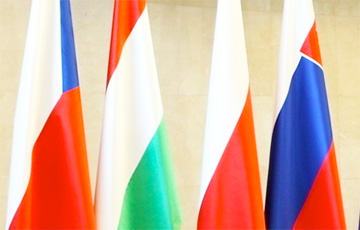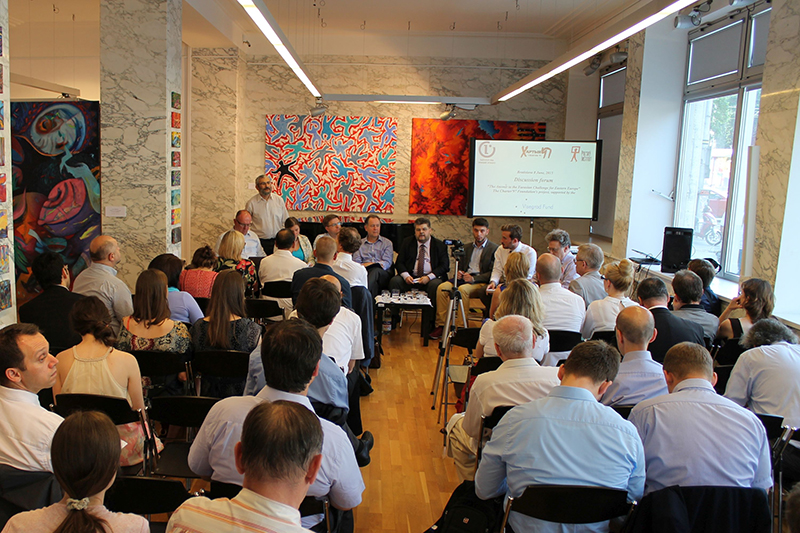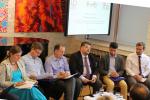European answer to Eurasia: One should be firm with Russia
- 15.06.2015, 17:10
- 3,814

A new project of Charter-97 is launched in Bratislava.
V4 Visegrad Countries - Poland, Slovakia, Hungary and Czech Republic - welcomed a proposal of the Charter-97 on implementation of research and media project "Eastern Partnership: European response to Eurasia". The project's objective is to conduct a thorough discussion and inform Governments and the general public of reasonableness of the initiative both for the European Union and member countries of the Eastern Partnership (Azerbaijan, Armenia, Belarus, Georgia, Moldova, and Ukraine).
Bratislava hosted the first working meeting of an authoritative international expert group, held in the office of the Polish institute. It united representatives of leading research centers of Visegrad Group, Belarus, Ukraine and Russia.
Grigorij Mesežnikov, President of Slovakian Institute for Public Affairs, István Gyarmati, Hungarian ex-Foreign Ministry and Director of the International Centre for Democratic Transition, Milan Ježovica, Senior Scientific Researcher of the M.E.S.A. 10 and the former State Secretary at the Ministry of Foreign Affairs of Slovakia, Bogdan Yaremenko, Chairman of the Board of Maidan of Foreign Affairs, Łukasz Wenerski (Poland), analyst and coordinator of programmes in the Institute of Public Affairs, Martin Mishlo, analyst of EUROPEUM Czech organization, Olga Zakharova, Director of Freedom Files organization, Uladzimir Kabets, Director of Warsaw Fund "Charter-97", Natallia Radzina, editor-in-chief of the website charter97.org, Zmitser Bandarenka, the coordinator of the civil campaign "European Belarus", Pavol Demeš, expert of the German Marshall Fund, the ex-Foreign Minister of Slovakia, Karla Wursterova, Executive Director of the International Visegrad Fund, Ukrainian political scientist Grigoriy Perepelica, the EU diplomats accredited in Slovakia, representatives of governmental and social organizations, as well as mass media of Slovakia were present at the meeting.
Though opinions on the Eastern Partnership effectiveness significantly differed, but, however, no one dared call the initiative fully corresponding to interests of participants. But the most important thing is that experts from Belarus, Russia and Ukraine stated that treat-all-alike approach towards all countries eastward of the EU was invalidate.
What should policy of the European Union towards neighbor countries be? Debaters in Bratislava answered the question:
István Gyarmati, Director of the International Centre for Democratic Transition (Hungary):
-Why is the Eastern Partnership's programme a failure? The region is neither more stable, democratic, nor more prosperous. The region has not achieved any initially set goal.
What are the reasons? There are internal and external ones. It is a dead end. There are no prospects to be a member of the Eastern Partnership. We have faced the wall. Now we have two ways: turn back or wreck the wall. Now we go back and call it a progress, but actually the wall is still there. The external reason is that we have underestimated the corruption level in these countries. What do we observe in Ukraine, Moldova, Azerbaijan, Armenia, and Belarus? This is not the corruption as in Hungary. It is the power taken over by corrupt oligarchs. It is much worse than an ordinary corruption. The second factor is the underestimated Russia's influence in these countries.
Both Russia and Western countries do not realize it. It results in our losing game against Russia. And it's a shame, because Russia is a weak country, which only tries to seem strong. They use armaments, which are recognized by many as power. But it is a weak point, because they have nothing but military force. And such a demonstration is observed not only in Ukraine: the same scenario was practiced in Georgia. They had a clear message for other countries - Armenia, Belarus - if you do not obey, we will throw the sword into the say.
We play by Russia's rules, so it is the main reason why we are losing the "game", inter alia, in Ukraine. What was the response to the military evasion and annexation of the Crimea? None. It is an inappropriate response. But I think there is a way out. The history shows that dictatorships win battles, but lose wars.
It will be a long war. Are we ready for it? Or will we use Russian aggression as an excuse to stay aside? The war in Ukraine is an excellent chance not to carry out reforms and a brilliant possibility for us not to support Ukraine. Everyone brings home the bacon. But it is evident that the European Union is economically much more stable than Russia. We should make advantage of it and introduce sanctions. But we have no strategy; we do not want to work on it, as it will mean that everything done before was wrong, as well as the necessity of changing our attitude towards the Eastern Partnership and Russia.
Bogdan Yaremenko, Chairman of the Board of Maidan of Foreign Affairs (Ukraine):
- "Dancing with dictators" topic was one of the urgent in the course of the "European response to Eurasia" meeting. Most experts and I believe that sacrificing of principles for the dialogue with dictators is a failing approach of no good result.
I, as representative of the country that not only upholds certain principles, but also disputes them in arms and fights unprovoked Russia's aggression, which is discontent that the Ukrainians can take their own way, understand that it was hard to focus on any other interests than Ukrainian ones.
My main theses prove that summarized approaches to all countries of the Eastern Partnership should be replaced by individual plans on the part of the EU. Even conditional division of countries of the Eastern Partnership into two subgroups - those wanting and not wanting to be a member of the EU - is only a limited solution, as situations within all states differ.
Meanwhile, the cooperation plan between Ukraine and the European Union must be focused on three objectives:
- strengthening the defense capability of Ukraine. I am against the war to be used by Ukrainian officials as an excuse for their unwillingness or inability to reform the country. But the homespun truth is that having lost 20% of its economy and spending daily $5-7 millions for military actions (by the way, this sum is daily spent by Ukraine to cover external debts), burying thousands of its sons and daughters, and taking care of hundreds of thousands of displaced persons from the Donbas and Crimea, Ukraine will not manage to focus on its internal reforms unless the lessening of a military and terrorist threat on the part of the Russian Federation. The EU can get Ukraine's firm political guarantees on the refusal to use military means to deepen into occupied territories in the foreseeable future. But it ought to give it a chance to acquire military equipment and armaments to guarantee a sustainable defense system;
- fighting an overwhelming corruption in Ukraine. This enemy of Ukrainian state is not less as dangerous as the "Russian peace". The EU should develop a long-term programme of action on the issue, involving educational, informational, legislative, law enforcement and other segments. The increased civil ability to control the authority must be one of the pillars of the plan;
- creation, with the assistance of civil society, of an effective mechanism to monitor the implementation of the association agreement between Ukraine and the EU. A meaningful and businesslike talk on how changes and reforms within the Agreement can result in better living conditions of the Ukrainians, especially in the absence of a clear perspective of joining the EU is welcomed.

Grigorij Mesežnikov, President of Slovakian Institute for Public Affairs:
- The "Eastern Partnership" (EP) programme with its mixed results has, undoubtedly, become an essential factor of European policy. It is obviously take some time to see how the summit in Riga affected the further implementation of the programme. Those who expected more do not mask their disappointment. According to them, the European Union failed to clear up the point on what it should do when three states, which signed the association agreement (Ukraine, Moldova, Georgia) are persistently knocking on its door, being convinced that the clearer their European perspective is, the easier they will manage to carry out necessary reforms.
Their realist opponents argue that, given the difficult situation in which the European Union has recently found itself, the issue of relations with Russia (especially the sanctions), "long-play" problem with Greece, not very bright outlooks of relations with Britain after a scheduled referendum about its further membership in the EU, the compromise reached at the Summit in Riga, should not be recognized as a failure. Besides, it is especially indicative that Russia in its effort to prevent former Soviet republics, currently independent states, from their way to Europe has decided to have an acute conflict with the West and continues to increase its rates precisely because of the EP programme. You should remember that irresistible desire of the current Russian government to stifle Ukrainian Euromaidan and deprive Ukraine of the European perspective have triggered Russia-Ukraine war.
In order to prevent the EP from turning into a formal political ritual one needs as follows:
- continue to move forward, deepening the process of interaction between the EU and the EP countries,
-find specific approaches to each of the six EP countries, considering that there are two groups of States of different status and different intentions of their political elites,
- abide by norms, principles and values on which the entire modern system of liberal democracy with the model of the European integration is based (freedom, human rights, democracy, the right of peoples of independent States to decide their own destiny without external interference),
-completely exclude any possible influence of the current Russian regime on the further programme implementation of the EP, so that relations between the EU and Russia would not intersect with its relations with EP countries (except when the EP countries voluntarily suppose it possible). Russia does not have any right to veto the accession of independent and neighboring countries of the EP into the EU. Only they have the right to decide their future.
All above is fully related to Eastern and Central European members of the EU, including V4 Visegrad Countries. A decade and a half ago, they were able to join the EU freely and without foreign interference. Today they are morally obliged to assist the EP countries with creation of the most favourable conditions for incremental movement towards Europe. The solidarity with the EP countries and their civil society must be an imperative.
Uladzimir Kabets, Director of Warsaw Fund "Charter-97":
- The role of Belarus is undervalued; anyway, it finds no reflection in policy of the European Union towards this country. We can say that the EU politicians has no strategy towards Belarus, all their actions are defined by current events.
The dualism demonstrates the falsity of the approach - on the one hand, Belarus joined the EurAsEC, on the other hand, it is a member of the Eastern Partnership. It is mutually exclusive projects. The Eurasian Union promotes the expansion of Russian authoritarian influence and model, while the Eastern Partnership is part of the European democratic project.
Thus, it is clear that the democratic Belarus is of critical meaning to a success of the European project, while authoritarian Belarus means the actual adoption of Russian model and Russian expansion in the region.
To implement bilateral contracts there should be a clear understanding of following things: accepting the unconditional resumption of relations with Lukashenka, the EU gives the way to Putin's model, threatening its own security and faith in the European project among countries of the Eastern Partnership.
That is why more-for-more principle should be activated in respect of Belarus. Increased contacts with regime should be compensated by increased support of the civil society.
Country's involvement in the Eastern Partnership and other contacts must not preserve the regime that is why we should be careful when choosing levers of influence.
When interacting on a multilateral basis, Belarus can play a significant role in the promotion of democracy and human rights in the region, but it should be a civil democratic society with the access to all members of the Eastern Partnership.
The civil society of Belarus has a great experience of resistance to authoritarian and then dictatorial regime. Independent mass media plays an important role in resistance to the dictatorship and Russian propaganda, and charter97.org is the leader.
Olga Zakharova, Director of Freedom Files organization (Russia):
-The Eastern Partnership is a European perspective for participating countries, in fact, export of values on which the European project is based - democracy and human rights, through which stability, prosperity, and security (as objectives for the European Partnership) are possible to achieve.
What does the Eurasian Union promise and export? This is a community of autocrats with the retention of power, maintenance of clans' well-being as the main objectives. The retention of autocracy by force and destruction of human institutions or just their imitation.
In fact it is a permanent bandit meeting, operating under their notions of the law with their own "Argie-bargie" and "gangland acts", as there can be no stable relations between gang leaders and shoot in the back. Such a project is opposed to the European one.
"Russian Peace" is actually a tool to undermine the stability of those who do not want to participate in the "Eurasian meeting".
Current aggressive actions, starting with propaganda, are aimed at the democratic world to agree to a new redivision of the world, and it will be the defeat for the European project. In fact, talks that Lukashenka may be not such a dictator if he sends "positive signals" to the West, and Aliyev, of course, is an autocrat, but he has hydrocarbons and pipes. It is the beginning of the end. Such ideas recognize that only division of the spheres of influence exists and values are a fig-leaf covering it.
The European Union is precisely the value guide for value oriented residents of countries of the European Partnership. In Belarus and Ukraine people took the squares with flags of the European Union. To abandon the value approach, replacing it with "political pragmatism" means to betray these people and recognize the victory of Putin-Eurasian approach and play under these rules.












